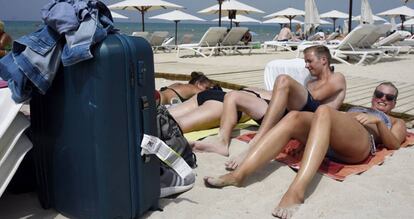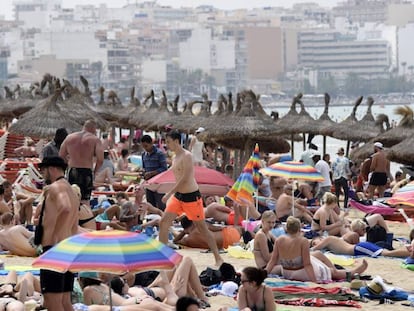Court records expose methods used in British food poisoning scam
Law firms in UK handled phony claims lodged against Mallorca hotels and kept 60% of payout


An investigating judge in Palma de Mallorca has lifted the seal on court records entered in the case of a scheme that may have cheated Spanish hotels out of as much as €60 million through phony food poisoning claims filed since 2014.
British law firms promised clients up to €18,000 and a 98% success rate in claims for gastric illness caused by the hotel food. The lawyers kept 60% of the payout, and the remainder was enough to cover the client¡¯s entire holiday package costs. Clients were sent to them by a ring operating out of Mallorca, where ¡°sales agents¡± were deployed to hotels in search of targets.
From January 2016 to the end of the summer, one hotel chain received 273 claims requesting compensation for 700 people
The Spanish Civil Guard arrested seven members of this ring, all British nationals, in September of last year. The suspects allegedly exploited lax British legislation by persuading hotel clients to file phony food poisoning claims against their tour operators.
Faced with high legal fees if the cases went to court, the tour operators would accept the claims, then pass on the cost to the Spanish hotels as per their contract, in which the latter accept responsibility for all damages.
The investigation was launched after several hotel groups filed police complaints. These hotels had hired private detectives who found that there was a network of agents sent out to hotels to persuade clients to file claims.
A Civil Guard report that shows up in court records mentions two individuals as the heads of the ring. These men operated out of Britain, where they channeled the claims through law firms ¡°with low professional ethics.¡±
Back on Mallorca, the local leaders were two women ¨C a mother and daughter ¨C whose job it was to hire agents and train them to persuade hotel clients to simulate gastric illnesses. These agents were always native English speakers who dealt directly with their targets at the hotels.
Civil Guard officers followed the activities of the ring and found that it was also active on the island of Tenerife, where it made around €115 for every successful claim. One of the women would routinely drive to the hotels to supervise her agents, especially in Sa Coma and Puerto de Alc¨²dia in the north of Mallorca.
The ring was also active in Tenerife, where it made around €115 for every successful claim
All seven arrested ring members kept in touch through a WhatsApp group called ¡°UK Holidays claims,¡± where they shared their clients¡¯ names and addresses, contact information, holiday reservation number, checkout date and the best time to call the client back in the UK. Each agent added his or her name to the message, to ensure that they would get the commission.
Years later
The National Police¡¯s economic crimes unit has also drafted a report in the case, and found that many of the complaints were filed years after the alleged gastric illness. Six tour operators continue to sell holiday packages for stays at hotels that appear to be serving food in bad state, judging by the claims.
The report notes that ¡°no health alarm originating in the targeted hotels has been reported at any time.¡± The Spanish Confederation of Hotels and Tourist Accommodation (CEHAT), which has been working to fight the fraud, said in May of last year that ¡°if [all the claims] were true, there would already have been a global health alert.¡±
One hotel chain said that from January 2016 to the end of the summer, it received 273 claims requesting compensation for 700 people. The estimated cost was €4.5 million, a 700% increase from previous years.
¡°Nearly 70% of claims are fraudulent or gray, meaning that the client was ill, but the pathology was unrelated to the food and drink at the hotel,¡± says Marc Ripoll, a lawyer who specializes in international law at Monlex Hispajuris, and who has advised the hotel sector on this type of fraud.
Lawyers¡¯ share
The police report also uncovered that the law firms that handle these claims keep 60% of the payout and give the remaining 40% to the client. They offer a 98% success rate at no cost to the tourist, as the firm only charges if the claim is successful. Clients are enticed with promises of ¡°up to ?40,000 in damages¡±, with the customer taking home an average €18,000.
Investigators also stressed the role of clients who ¡°necessarily cooperate with this scheme and agree to feign illness to get a free vacation.¡± So far, 800 tourists who filed claims through 77 different law firms have been identified.
In May of this year, the Hotel Business Federation of Mallorca asked for UK visitors to be banned outright from all-inclusive vacation packages.
British cooperation
Operation Claims was carried out in September of last year with assistance from the Hotel Business Federation of Mallorca (FEHM) and the UK government. Ambassador Simon Manley had visited the island in April to address the issue.
The arrests came nine days after UK officials had stripped the license from a British company called Allsure Ltd following an investigation by the British government¡¯s Claims Management Regulator (CMR), which found that the company ¡°had encouraged holiday-goers to fabricate or embellish symptoms of gastric illness to get compensation. Further evidence showed the firm had used deceptive sales scripts ¨C exaggerating expected pay-outs to entice consumers.¡±
In July, the British government launched an awareness campaign warning tourists that they could face prosecution at home and abroad if found to have lodged bogus sickness claims.
English version by Susana Urra.
Tu suscripci¨®n se est¨¢ usando en otro dispositivo
?Quieres a?adir otro usuario a tu suscripci¨®n?
Si contin¨²as leyendo en este dispositivo, no se podr¨¢ leer en el otro.
FlechaTu suscripci¨®n se est¨¢ usando en otro dispositivo y solo puedes acceder a EL PA?S desde un dispositivo a la vez.
Si quieres compartir tu cuenta, cambia tu suscripci¨®n a la modalidad Premium, as¨ª podr¨¢s a?adir otro usuario. Cada uno acceder¨¢ con su propia cuenta de email, lo que os permitir¨¢ personalizar vuestra experiencia en EL PA?S.
?Tienes una suscripci¨®n de empresa? Accede aqu¨ª para contratar m¨¢s cuentas.
En el caso de no saber qui¨¦n est¨¢ usando tu cuenta, te recomendamos cambiar tu contrase?a aqu¨ª.
Si decides continuar compartiendo tu cuenta, este mensaje se mostrar¨¢ en tu dispositivo y en el de la otra persona que est¨¢ usando tu cuenta de forma indefinida, afectando a tu experiencia de lectura. Puedes consultar aqu¨ª los t¨¦rminos y condiciones de la suscripci¨®n digital.
More information










































